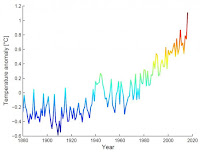A record fire-storm in Canada fueled by record warmth. Record ice-melt in Greenland and the Arctic sea, driven by off-the-charts warmth in the far north. And, NASA reported Friday, we’ve just been through the hottest April and the hottest January-April on record — by far.
Last month smashed the record for hottest April, as this chart of NASA data (via Rahmstorf) shows:
How big a jump was April 2016 compared to the historical record? In an email, Stefan Rahmstorf, Head of Earth System Analysis at the Potsdam Institute for Climate Impact Research, notes that “The margin by which April beats the previous record April is three times larger (0.24 °C) than the margin of any previous record April (biggest was 0.08 °C).”
Also, this has easily been the hottest January-April on record, which isn’t a surprise given that last month’s record was hot on the heels of the hottest March on record by far, which followed the hottest February on record by far, and hottest January on record by far.
Dr. Gavin Schmidt, the head of NASA’s Goddard Institute of Space Studies, points out on twitter that there is a pattern between how hot Jan-April is and how hot the full year is. He notes that if this pattern holds, then there is a greater than 99% chance that 2016 will be the hottest year on record. (Note: The chart right uses a different temperature scale than the previous chart: It compares recent temperatures to the preindustrial average rather than 1950 to 1981).
Scorching temperatures have extended over many months in the Arctic, and that means we have the perfect conditions for both wildfires and melting ice.
Last year, which set the record for hottest year ever, also set the record for the worst U.S. wildfire year with more than 11 million acres burned. Siberia, Mongolia and China also saw massive blazes.
This year, Alberta Canada has been so hot and so dry so early in the year that it has already fallen victim to a devastating firestorm:
“It’s not just Alberta: Fires fueled by warming climate are increasing,” as a CBC headline read last week. Arizona University climatologist Jonathan Overpeck expained, “The Alberta wildfires are an excellent example of what we’re seeing more and more of: warming means snow melts earlier, soils and vegetation dries out earlier, and the fire season starts earlier. It’s a train wreck.”
Tragically, the warming-driven wildfires themselves cause more carbon dioxide to be released into the atmosphere, an amplifying feedback that speeds up the very climate change that causes more wildfires.
Read more at A Song of Fire and No Ice: We Just Had Our Fourth Record-Breaking Hottest Month in a Row This Year


No comments:
Post a Comment